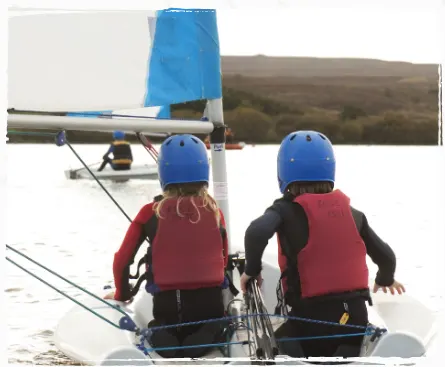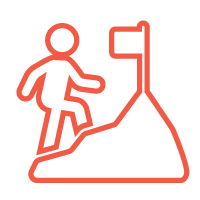sail your own boat
Working in pairs or small teams, students go from knowing nothing about sailing to whizzing about on the water with a big grin of satisfaction on their face!
Students will learn to sail for themselves and our beginner friendly boats allow amazing levels of progress and a real sense of achievement and ownership.
Sailing is a seasonal activity and is available from the Easter holidays to the October Half Term.
What’s Included
Students are provided with the following equipment, as and when appropriate.

All specialist equipment
Sailboat, watersports helmet, and buoyancy aid.
All specialist clothing
Wetsuit and waterproofs when required.
Transport
Once at the centre, all transport to and from adventure activities is provided.
Experienced, full-time, outdoor teachers and tutors
Each group of 12 students is led by a fully qualified and experienced outdoor tutor.
– back in the classroom –
curriculum links
Sailing is an excellent way to enhance the curriculum, many areas can be used and learnt practically such as learning how a sail boat moves using the wind can cover forces and motion for science and geometry in maths. Sailors can engage with the rich history of sailing what it has achieved and famous explorers that discover new areas of the world.
Key Stage 2
Maths: Geometry
In sailing, angles are used constantly. Students can learn all about the angles compared to the wind – which angles are faster, slower, and those you cannot sail in which would require changes in the angle of their sail.
History: Local
Students can learn about the history of sailing, and famous local sailors such as Captain Cook. They can also learn all about the local history of the environment in which they are sailing – why the water is there, what it is used for, and what the land around the reservoir is used for.
Key Stage 3
Science: Forces and motion
Students can learn about the forces involved in making a sailboat move, how sails work and the forces that cause the boat to slow down. They can also explore what affects the acceleration of a sailboat.
Geography: Human
Students can learn about where they are sailing – how this was shaped by humans, and past and present industrial activity.
Key Stage 4
P.E : Individual or Team sport
Following the GCSE P.E curriculum, we can develop students skills to help them perform key sailing skills and maneuvers in increasingly demanding and progressive drills, in interesting and fun environments.
Geography
Weather hazards and extreme weather events are part of the GCSE curriculum. Students can spend time talking about the types of these hazards, and how they can affect sailing.
LOCATIONS: Offered at both Bewerley Park and East Barnby
YEAR GROUPS: Suitable for Primary School, Secondary School, and post 16 students

DURATION: Available as a full day activity

DIFFICULTY: Adapted to the age and level of experience of students on adventure
MIN GROUP SIZE: 12 Students
sail your own boat
Working in pairs or small teams, students go from knowing nothing about sailing to whizzing about on the water with a big grin of satisfaction on their face!
Students will learn to sail for themselves and our beginner friendly boats allow amazing levels of progress and a real sense of achievement and ownership.
What’s Included?
All specialist equipment
Sailboat, buoyancy aid, and watersports helmet.
All specialist clothing
Waterproofs and wetsuits when required.
Transport
Once at the centre, all transport to and from adventure activities is provided.
Experienced, full-time, outdoor teachers and tutors
Each group of 12 students is led by a fully qualified and experienced outdoor tutor.
classroom benefits
curriculum links
Sailing is an excellent way to enhance the curriculum, many areas can be used and learnt practically such as learning how a sail boat moves using the wind can cover forces and motion for science and geometry in maths. Sailors can engage with the rich history of sailing what it has achieved and famous explorers that discover new areas of the world.
Key Stage 2
Maths: Geometry
In sailing, angles are used constantly. Students can learn all about the angles compared to the wind – which angles are faster, slower, and those you cannot sail in which would require changes in the angle of their sail.
History: Local
Students can learn about the history of sailing, and famous local sailors such as Captain Cook. They can also learn all about the local history of the environment in which they are sailing – why the water is there, what it is used for, and what the land around the reservoir is used for.
Key Stage 3
Science: Forces and motion
Students can learn about the forces involved in making a sailboat move, how sails work, and the forces that cause the boat to slow down. They can also explore what effects the acceleration of a sailboat.
Geography: Human
Students can learn about where they are sailing – how this was shaped by humans, and past and present industrial activity.
Key Stage 4
P.E: Individual or Team Sport
Following the GCSE P.E curriculum, we can develop student’s skills to help them perform key sailing skills and manoeuvres in increasingly demanding and progressive drills, in interesting and fun environments.
Geography
Weather hazards and extreme weather events are part of the GCSE curriculum. Students can spend time talking about types of these hazards, and how they can affect sailing.